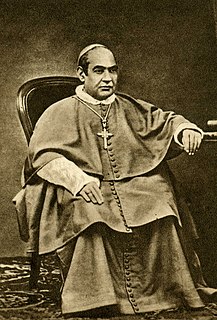A Quote by Thomas Aquinas
It must be said that charity can, in no way, exist along with mortal sin.
Related Quotes
Charity is not a potency of the soul, because if it were it would be natural. Nor is it a passion, because it is not in a sensitive potency in which are all passions. Nor is it a habit, because a habit is removed with difficulty; charity, however, is easily lost through one act of mortal sin. Therefore charity is not something created in the soul.
Half-instructed confessors have done my soul great harm; for I could not always have such learned ones as I would have desired. They certainly did not wish to deceive me, but the fact was that they knew no better. Of something which was a venial sin, they said it was no sin, and out of a very grave mortal sin they made a venial sin. This has done me such harm, that my speaking here of so great an evil, as a warning to others, will be readily understood.
Marital intercourse is certainly holy, lawful and praiseworthy in itself and profitable to society, yet in certain circumstances it can prove dangerous, as when through excess the soul is made sick with venial sin, or through the violation and perversion of its primary end, killed by mortal sin; such perversion, detestable in proportion to its departure from the true order, being always mortal sin, for it is never lawful to exclude the primary end of marriage which is the procreation of children.
It was the consideration of the multitude of souls which fall into the depths of Hell, because it is of faith that all those who die in mortal sin are condemned forever and ever. According to statistics, approximately 80,000 persons die every day. How many of these will die in mortal sin, and how many will be condemned, for, as their lives have been, so also will their end be.
When we want to help the poor, we usually offer them charity. Most often we use charity to avoid recognizing the problem and finding the solution for it. Charity becomes a way to shrug off our responsibility. But charity is no solution to poverty. Charity only perpetuates poverty by taking the initiative away from the poor. Charity allows us to go ahead with our own lives without worrying about the lives of the poor. Charity appeases our consciences.
It must be granted that in every syllogism, considered as an argument to prove the conclusion, there is a petitio principii. When we say, All men are mortal Socrates is a man therefore Socrates is mortal; it is unanswerably urged by the adversaries of the syllogistic theory, that the proposition, Socrates is mortal.




































